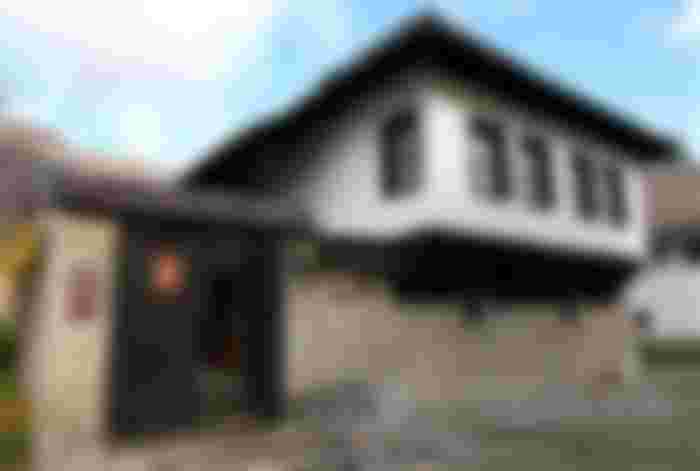
Ivo Andrić was born on October 9, 1892 in Dolac near Travnik. Although it is written in the church books that he was born on October 9, the writer often pointed out that he was born on the night between October 9 and 10, and in all documents he entered October 10 as the date of birth. That day is also taken as the day of his birth by the Ivo Andrić Endowment, as well as the Memorial Museum of this writer in Belgrade.

The future great writer was born in Dolac due to circumstances, while his mother was staying with relatives. As a two-year-old boy, Andrić lost his father, who died as a result of tuberculosis. Having lost her husband and faced a lack of money, Ivo's mother moved with her son to live with her parents in Višegrad, where young Andrić spent his childhood and finished primary school. In 1903, Andrić enrolled at the Sarajevo High School, the oldest high school in Bosnia and Herzegovina. During his high school days, Andrić began to write poetry and in 1911 he published his first poem "In the Twilight". As a high school student, Andrić was an ardent supporter of integral Yugoslavia, a member of the progressive nationalist movement Young Bosnia and a passionate fighter for the liberation of the South Slavic peoples from the Austro-Hungarian monarchy. After receiving a scholarship from the Croatian cultural and educational society "Progress", Andrić began studying Slavic literature and history at the Faculty of the Royal University in Zagreb in October 1912. The following year, he transferred to the University of Vienna, but he did not like the Viennese climate, and he, hereditarily burdened with sensitive lungs, often suffered from inflammation. So, the following year he transferred to the Faculty of Philosophy of the Jagiellonian University in Kraków. In Krakow, he lived with a family whose daughter Jelena Irzikovska could be a prototype for "Jelena, a woman who doesn't exist", a character from Andrić's famous story.

In 1914, on the news of the Sarajevo assassination and the death of Archduke Franz Ferdinand, Andrić packed his student suitcases, left Krakow and came to Split. Immediately upon his arrival in Split, in mid-July, the Austrian police arrested him.
During his time in prison, Andrić intensively wrote poems n prose.
In the summer of 1917, when a general amnesty was announced, Andric returned to Visegrad.
Andrić had a very successful diplomatic career. At the beginning of October 1919, he started working as an official in the Ministry of Religion in Belgrade. In 1920, he was appointed clerk in the Vatican embassy, and then worked as a diplomat in the consulates in Bucharest, Trieste and Graz. At that time, he published a collection of poems in prose "Unrest", short stories "Jorkan and Schwabica", "Mustafa Magyar", "Love in the town", "In musafirhana" and a cycle of poems "What I dream and what happens to me".
In June 1924, he defended his doctoral thesis at the University of Graz "Development of the spiritual life in Bosnia under the influence of Turkish rule."

Ivo Andrić's diplomatic career reached its peak in 1939: on April 1, a statement was issued that Ivo Andrić had been appointed Minister Plenipotentiary and Ambassador Extraordinary and Plenipotentiary of the Kingdom of Yugoslavia in Berlin.
The day after the bombing of Belgrade, on April 7, Andrić left Berlin with his staff. They spent the next two months on Lake Constance. He refused to take refuge in Switzerland, and with the staff and members of their families, he arrived in Belgrade by a special train on June 1, 1941, which ended his diplomatic career. In November 1941, he retired at his own request, although he refused to receive a pension.
In the silence of his rented room, he first wrote the novel Travnička hronika, and at the end of 1944 he finished the novel Na Drini ćuprija. Both novels will be published in Belgrade a few months after the end of the war. At the end of 1945, the novel Miss was published in Sarajevo.
In 1961, the Nobel Committee awarded Andrić the Nobel Prize for Literature "for an epic power with which he shaped themes and presented the destinies of people throughout the history of his country." Andrić donated the million-dollar prize money won by winning the Nobel Prize for the development of librarianship in Bosnia and Herzegovina.

Andrić died on March 13, 1975 at the old Military Medical Academy in Belgrade. He was buried in the Alley of Deserving Citizens at the New Cemetery.

10 most beautiful quotes from Ivo Andrić:
"It is not terrible that he grows old, weak and dies, but that new, younger and different ones come after us and come. In fact, that is death."
"The course of events in life does not depend on us, in any way or very little, but the way we will endure events depends to a large extent on ourselves, so we should spend energy and pay attention to that."
"If people knew how little intelligence rules the world, they would die of fear."
"The evil and goodness of a nation are the product of the circumstances in which it lives and develops."
"There will come a time when the wise will be silent, fools will speak, and scoundrels will get rich."
"The need to cheat is so alive in a weak man and such an unlimited possibility of being deceived."
"Then he felt how a man can break and split in himself, how he can fall and rise in his eyes, in short: how passages can be ecstasies, how indefinite and intertwined they last, how expensive they are and they grieve bitterly when they pass. "
"It is unfortunate to live without God and betray the faith of the fathers."
"For lovers, time is always short and no path is long enough."
"I have not yet seen that someone who was beaten forgot that, but I have seen a hundred times that people forget even the best advice and lessons."






One of our greatest creators! His works remain with us forever!